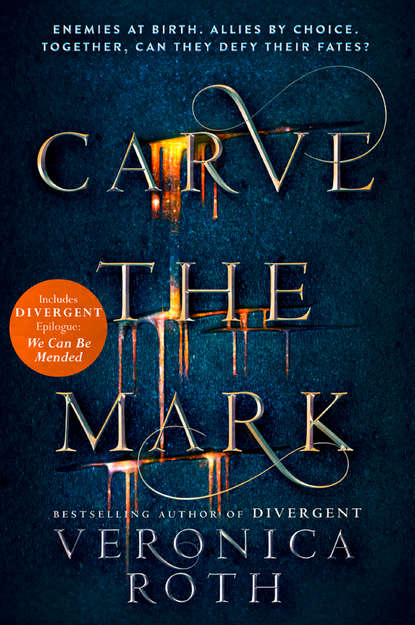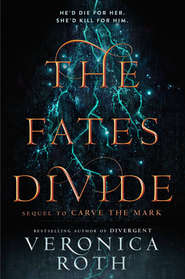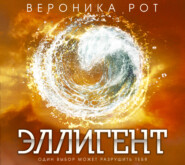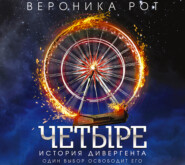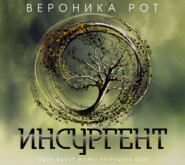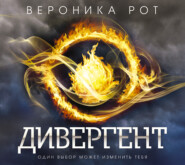По всем вопросам обращайтесь на: info@litportal.ru
(©) 2003-2025.
✖
Carve the Mark
Настройки чтения
Размер шрифта
Высота строк
Поля
All the pain that had been building in me came rushing back at once, and I seized my head with both hands, stifling a cry. I could hardly see my brother through the haze of tears, but I tried to focus on his face, which was pale as a corpse.
There were rumors about me all throughout Shotet and Thuvhe, encouraged by Ryzek—and maybe those rumors had traveled all throughout the galaxy, since all mouths loved to chatter about the favored lines. They spoke of the agony my hands could bring, of an arm littered with kill marks from wrist to shoulder and back again, and of my mind, addled to the point of insanity. I was feared and loathed at the same time. But this version of me—this collapsing, whimpering girl—was not that person of rumor.
My face burned hot, from something other than pain: humiliation. No one was supposed to see me like this. How could Ryzek bring him here when he knew how I always felt, after … well, afterward?
I tried to choke back my anger so Ryzek wouldn’t hear it in my voice. “Why have you brought him here?”
“Let’s not delay this,” Ryzek said, and he beckoned Akos forward. They both drew closer to me, Akos’s right arm pulled close to his body, like he was trying to stay as far away from my brother as possible without disobeying him.
“Cyra, this is Akos Kereseth. Third child of the family Kereseth. Our”—Ryzek smirked—“faithful servant.”
He was referring, of course, to Akos’s fate, to die for our family. To die in service, as the Assembly feed had proclaimed two seasons ago. Akos’s mouth twisted at the reminder.
“Akos has a peculiar currentgift that I think will interest you,” Ryzek said.
He nodded to Akos, who crouched beside me, then extended his hand, palm up, for me to take.
I stared at it. I almost didn’t know what he meant by it, at first. Did he want me to hurt him? Why?
“Trust me,” Ryzek said. “You’ll like it.”
As I reached for Akos, the darkness spread beneath my skin like spilled ink. I touched my hand to his, and waited for his scream.
Instead, all the currentshadows ran backward and disappeared. And with them went my pain.
It was not like the remedy that I had swallowed earlier, which made me sick, at worst, and dulled all sensation, at best. It was like returning to the way I had been before my gift developed; no, even that had never been as quiet and as still as I felt now, with my hand on his.
“What is this?” I said to him.
His skin was rough and dry, like a pebble not quite smoothed by the tide. Yet there was some warmth in it. I stared at our joined hands.
“I interrupt the current.” His voice was surprisingly deep, but it cracked like it was supposed to at his age. “No matter what it does.”
“My sister’s gift is substantial, Kereseth,” Ryzek said. “But lately it has lost most of its usefulness because of how it incapacitates her. It seems to me that this is how you can best fulfill your fate.” He bent closer to Akos’s ear. “Of course, you should never forget who really runs this house.”
Akos didn’t move, though a look of revulsion passed over his face.
I sat back on my heels, careful to keep my palm on Akos’s, though I couldn’t look him in the eye. It was as if he had walked in on me while I was changing; he had seen more than I ever let people see.
When I stood, he stood with me. Though I was tall myself, I only came up to his nose.
“What are we supposed to do, hold hands everywhere we go?” I said. “What will people think?”
“They will think he is a servant,” Ryzek said. “Because that is what he is.”
Ryzek stepped toward me, lifting his hand. I recoiled, yanking my hand from Akos’s grasp, and flushing with black tendrils all over again.
“Do I detect ingratitude?” Ryzek asked. “Do you not appreciate the efforts I have made to ensure your comfort, what I am giving up by offering you our fated servant as a constant companion?”
“I do.” I had to be careful not to provoke him. The last thing I wanted was more of Ryzek’s memories replacing my own. “Thank you, Ryzek.”
“Of course.” Ryzek smiled. “Anything to keep my best general in prime condition.”
But he didn’t think of me as a general; I knew that. The soldiers called me “Ryzek’s Scourge,” the instrument of torment in his hand, and indeed, the way he looked at me was the same way he looked at an impressive weapon. I was just a blade to him.
I stayed still until Ryzek left, and then, when Akos and I were alone, I started pacing, from the desk to the foot of the bed, to the closed cabinets that held my clothes, back to the bed again. Only my family—and Vas—had been in this room. I didn’t like how Akos stared at everything, like he was leaving little fingerprints everywhere.
He frowned at me. “How long have you been living this way?”
“What way?” I said, more harshly than I meant to. All I could think about was how I must have looked when he saw me, cowering on the floor, streaked with tears and soaked with sweat, like some kind of wild animal.
His voice softened with pity. “Like this, keeping your suffering a secret.”
Pity, I knew, was just disrespect wrapped in kindness. I had to address it early, or it would grow unwieldy in time. My father had taught me that.
“I came into my gift when I had only lived eight seasons. To the great delight of my brother and father. We agreed that I would keep my pain private, for the good of the Noavek family. For the good of Shotet.”
Akos let out a little snort. Well, at least he was done with pity. That hadn’t taken long.
“Hold out your hand,” I said quietly. My mother had always talked quietly when she was angry. She said it made people listen. I didn’t have her light touch; I had all the subtlety of a fist to the face. But still, he listened, stretching out his hand with a resigned sigh, palm up, like he meant to relieve my pain.
I brought my right wrist to the inside of his, grabbed him under his shoulder with my left hand, and turned, sharply. It was like a dance—a shifted hand, a transfer of weight, and I was behind him, twisting his arm hard, forcing him to bend.
“I may be in pain, but I am not weak,” I whispered. He stayed still in my grasp, but I could feel the tension in his back and his arm. “You are convenient, but you are not necessary. Understand?”
I didn’t wait for a response. I released him, stepping back, my currentshadows returning with stinging pain that made my eyes water.
“Next door there’s a room with a bed in it,” I said. “Get out.”
After I heard him leave, I leaned into the bed frame, eyes closed. I didn’t want this; I didn’t want this at all.
(#ulink_1c43f5cf-830d-5352-9281-48f9170aac88)
I DIDN’T EXPECT AKOS Kereseth to return, not without being dragged. But he was at my door the next morning, a guard lingering a few paces behind him, and he had a large vial of purple-red liquid in hand.
“My lady,” he said, mocking. “I thought, since neither of us wants to maintain constant physical contact, you might try this. It’s the last of my stores.”
I straightened. When the pain was at its worst, I was just a collection of body parts, ankle and knee and elbow and spine, each working to pull me up straight. I pushed my tangled hair over one shoulder, suddenly aware of how strange I must look, still in my nightgown at noonday, a sleeve of armor around my left forearm.
“A painkiller?” I asked. “I’ve tried those. They either don’t work or they’re worse than the pain.”
“You’ve tried painkillers made from hushflower? In a country that doesn’t like to use it?” he asked me, eyebrows raised.
“Yes,” I replied, terse. “Othyrian medicines, the best available.”
“Othyrian medicines.” He clicked his tongue. “They may be the best for most people, but your problem isn’t what ‘most people’ need help with.”
“Pain is pain is pain.”





